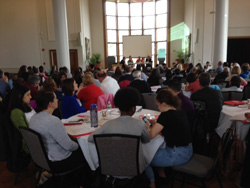Action Alert
Great news!
The Senate criminal justice reform bill that will be voted on within the next week includes key provisions we support from H.328/S.876, An Act decriminalizing non-violent and verbal student misconduct.

These important provisions eliminate the practice of arresting students for minor behavioral infractions and establish standards and accountability for police in schools. This is an issue that disproportionately affects students of color and students with disabilities, and is a crucial component of our work to disrupt the school-to-prison pipeline.
Another important provision of these bills relates to data collection. Right now, the information and reporting on school arrests is scattered and incomplete. S2170 would require establishing systems for arrest data collection, reporting, and publication – similar to the reporting system for school suspensions.
I want to thank you for standing with us to push these bills to the front of the conversation! Your hard work will ensure that we keep kids in class where they belong.
But it’s not over yet!
We need you to call or email your state Senator and ask him/her to support these provisions in S2107. We’ve made it easy for you by providing a script that you can use below!
Click here to find contact information for your State Senator and then call or email them using the script below!
Script:
Hi, my name is ________ and I am calling to encourage Senator _______ to support comprehensive juvenile justice reform that prioritizes the wellbeing of students. Sections 13, 174, and 175 of Senate Bill 2170, (the omnibus criminal justice reform) support school discipline that moves away from unnecessary arrests and requires data collection and reporting of school based arrests.
These provisions would:
- eliminate the practice of arresting students for minor behavioral infractions;
- establish standards and accountability for police in schools; and
- require establishing systems for arrest data collection, reporting, and publication – similar to school suspensions.
These provisions are necessary because:
- Unnecessarily arresting students ruins lives and encourages youth to drop out of school.
- Students who drop out are more likely to go to prison, earn less income and rely more on public benefits than students who complete school.
- Student arrests disproportionately target students of color and students with disabilities.
- No data is currently collected or reported about school based arrests.
- Data collection will inform us on the prevalence and reasons for arresting students.
- Reporting school arrests would be a simple additional requirement to reporting that school districts already file with the Department of Elementary and Secondary Education.
Please support a final Criminal Justice Reform bill that includes these provisions!
Join us and call or email your State Senator today!
Want to stay informed on the latest issues Massachusetts Appleseed is working on?
Sign up for future action alerts.

